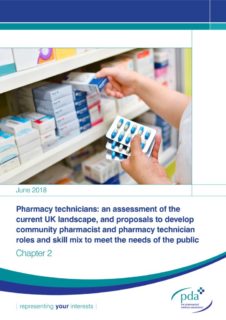Regulation of Pharmacy Technicians must be capable of protecting the public if they are to support pharmacists in the future says PDA
The existence of a register of pharmacy technicians cannot be relied upon in isolation to protect the public but must be underpinned by a suitably structured career framework linked to pay banding at a significantly higher level than is currently the case in community pharmacy if pharmacy technicians are to be able to support the roles of pharmacists, recommends a report published today by The Pharmacists’ Defence Association (PDA) .
The recommendations come after the study of fifty months of GPhC disciplinary hearings of pharmacists and pharmacy technicians that show that over the period only 22% of pharmacy technicians attended their professional disciplinary meetings as compared to 77% of pharmacists who attended theirs when called to do so.
The report argues that the threat of the ‘ultimate sanction’ – the removal from the register – is an important public safeguard providing the necessary regulatory traction to ensure that any healthcare professionals have due regard for the consequences of their actions, performance and behaviours not only in their work but also in their general activities.
However, the prospect of removal from the register can only influence behaviours and standards of practice if it can bring about significant loss of income, career damage and loss of reputation or status. If registrants do not have an income, career and reputation or status that they believe is worth protecting, then regulatory traction is reduced and the protection afforded to the public by regulation will be diminished.
The transcripts from GPhC regulatory cases reveal some of the reasons why pharmacy technicians do not attend or engage with the regulatory process and the problem is of such concern that a chair of the Fitness to Practice Committee when presiding over one case involving a pharmacy technician who did not engage in the regulatory process said;
“I am bound to say that, in my experience, it is not infrequent for pharmacy technicians not to engage with the process, so it is difficult to categorise this case as rare and exceptional.”
A wider study of the salaries of technicians from all of the other healthcare professions shows that the salaries for pharmacy technicians employed in community pharmacy were the lowest of all and was equivalent to only the level of the UK Living Wage. The average annual salary for a community pharmacy technician appears to be comparable to that of a cleaner or housekeeper or that of a general service occupation such as retail cashier, checkout operator and travel agent. The PDAs report finds that pharmacy technicians from the hospital setting, especially those at more advanced stages of their careers are on much higher pay grades and they also enjoy a structured career framework, where skills and experience are linked to a supportive pay banding structure.
It is evident that a detrimental sanction from the GPhC is likely to have little or no impact upon a pharmacy technician’s future salary prospects, if they are from a community pharmacy background as they can easily earn the same and often significantly more in roles outside of healthcare.
The Report’s Recommendations
- The existence of a register (a public list) of pharmacy technicians cannot be relied upon in isolation to protect the public. It must be underpinned by a suitably structured career framework for pharmacy technicians to support the roles of pharmacists, linked to pay banding at a significantly higher level than is currently the case in community pharmacy.
- If regulatory traction for pharmacy technicians is to be improved, the ultimate sanction, which is designed to protect the public, must indeed represent a meaningful loss of income, career damage and loss of status or reputation.
- Pharmacy regulatory bodies should consider whether regulation of pharmacy technicians is likely to be effective given the current conditions prevailing in community pharmacy.
DOWNLOAD a summary of the second chapter HERE
DOWNLOAD THE FULL SECOND CHAPTER HERE

